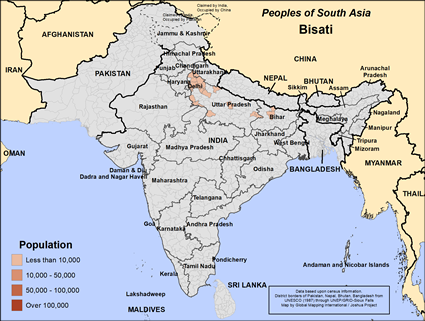Bisati in India

Send Joshua Project a photo
of this people group. |

Map Source:
People Group data: Omid. Map geography: UNESCO / GMI. Map Design: Joshua Project
|
| People Name: | Bisati |
| Country: | India |
| 10/40 Window: | Yes |
| Population: | 8,000 |
| World Population: | 8,000 |
| Primary Language: | Urdu |
| Primary Religion: | Islam |
| Christian Adherents: | 0.00 % |
| Evangelicals: | 0.00 % |
| Scripture: | Complete Bible |
| Ministry Resources: | Yes |
| Jesus Film: | Yes |
| Audio Recordings: | Yes |
| People Cluster: | South Asia Muslim - other |
| Affinity Bloc: | South Asian Peoples |
| Progress Level: |
|
Introduction / History
The Bisati believe they originally came from Pakistan and migrated to north India during the Mughal period. They are peddlers or sellers of merchandise. Their name mean to sell goods spread out on a carpet or mat not in a shop. They sell all types of merchandise such as stationery, bangles, glassware, cotton cloth, needles, pins, knives and other small hardware. Some Bisati have prospered and own large retail stores. Others sell their goods at open markets and village squares.
The main language of the Bisati is Urdu. They also speak Hindi and other regional languages.
Where Are they Located?
Most Bisati today live in the Indian state of Uttar Pradesh. A smaller number lives in Bihar and Uttarakhand. Some Bisati also reside in Pakistan.
What Are Their Lives Like?
The lives of the Bisati revolve around their Sunni Muslim faith and the selling of goods to others. They are considered a lower to middle class Muslim community in India. In Uttar Pradesh they are classified as a Scheduled Caste and receive special benefits from the government such a public jobs and college admission.
The Bisati are endogamous, that is, they strongly prefer to marry within their caste or clan. Cousin marriages are common. Unfortunately, child marriage of girls is still prevalent. Boys receive the equivalent of a high school education while girls receive only a primary education. Sons inherit the father's property with the eldest son taking responsibility for the family home, his mother and younger siblings. Muslim priests officiate at important family events such as births, wedding and funerals.
The Bisati dead bury their dead.
The Bisati are not vegetarian. As followers of Islam, they do not eat pork. Their main foods are rice, wheat, millet, lentils, dairy products and seasonal fruits and vegetables.
What Are Their Beliefs?
The Bisati are Sunni Muslims. They strive to follow the teaching of the Qur 'an and the prophet Muhammad. They attempt to obey the five Pillars of Islam in order to achieve salvation. If they have the means they try to make a Hadj or pilgrimage to Mecca one time in their lives. They participate in the yearly monthly fast of Ramadan and the holiday of breaking the fast called Eid al Fitr. Their other main holy day is Eid al Adha, the feast of the sacrifice, which commemorates Abraham's willingness to sacrifice his son.
What Are Their Needs?
The Bisati need to hear the life-changing message about Jesus Christ in a way they can understand. They need to see the love and mercy of Christ lived out in a practical way before them by Christ followers. They must realize that Jesus or Isa is much more than a human prophet as Islam asserts.
Prayer Points
Pray for Christian laborers to have wisdom in applying the pattern Jesus gave in Matthew 10 and Luke 10, leading to blessing among Bisati households.
Pray the Lord will start a movement of Bisati families experiencing God's rich blessings.
Pray the Lord opens the hearts of the Bisati elders so they might receive the forgiveness of sins that only Jesus offers.